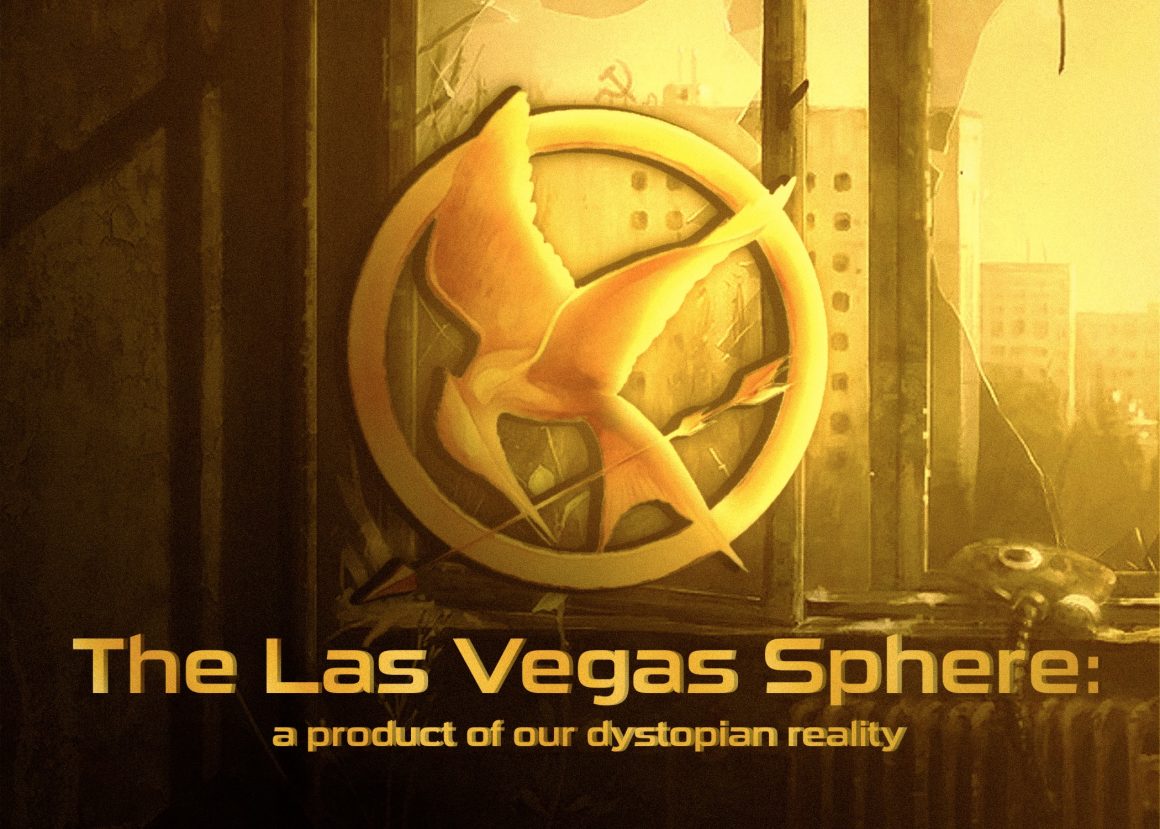
The Las Vegas Sphere: a product of our dystopian reality
By Nazeefa Ahmed, August 25 2023—
The Madison Square Garden (MSG) sphere at The Venetian Resort is a 2.3 billion USD investment on a spherical LED screen and arena set to host many musical performances, sporting events and film showcases starting this September. Since its media debut, viewers have been fascinated by the engineering feat. Comments under Youtube drone shots marvel at the futuristic stadium, praising architects and engineers for showcasing the extent of human capacity and for illuminating the Vegas skyline for the better.
But something about the marketing and news coverage of the 366-foot stadium reeks of a bleak dystopia: one where the promise of mesmerizing entertainment masks a society mirroring Suzanne Collins’ The Hunger Games. The arena’s very existence raises questions of societal priorities, oppression and ignorance — its gigantism, both a commentary on our values and a challenge to our ethics — and it all begins in Panem.
The Hunger Games is a story of Panem, a future America divided into twelve districts with a gleaming Capitol at the centre. President Snow rules the totalitarian dictatorship, and takes resources from the Districts so the wealthy citizens in the Capitol can maintain luxurious lives. To distract the people from the injustice, Snow hosts the Hunger Games in an arena where teenagers from each of the districts fight to their death. The games serve as a reminder to the districts that they are forever bound to a system that keeps them impoverished and imprisoned.
Capitol arenas were technologically advanced, with customizable weather, genetically modified animals and numerous cameras to capture the game. President Snow hired brilliant minds to bring the games to life — the game masters spared no expense marketing the greatest show in Panem so no one in the Districts could think to look away. But, despite the engineering feat, its existence always represented something grave — a society powerless to a show of opulence, even if it comes at the expense of their freedom.
In the same way, the MSG Sphere’s 1.2 million LED lights are a blinding reminder of who commands attention and respect in a world of distraction. Investors know that if Taylor Swift hosts a concert, all 18,000 seats in the Sphere will be sold. If Oleksandr Usyk’s public relations team promotes tickets to his next match on Instagram, the website will crash due to the demand. While community initiatives and policy petitions go stale from citizen silence, celebrity appearances in our cities effectively capture our time and attention. The Sphere’s 2.3 billion dollar price tag makes perfect sense given some context.
The President Snow of our world may not be ruling over us from Parliament or Congress, but his power is present in the many avenues of distraction available at a moment’s notice. After a long day of arduous work that never really pays enough, the shrinking middle class inevitably turns to him in the form of streaming services, video games and short-form content. We shut off our brains and let a meaningless show or TV program take center stage in our minds, numbing ourselves from the week’s work that lays ahead.
President Snow was able to keep the attention of Panem away from their problems and towards the Capitol by equating entertainment with freedom. When the daily updates from the arena were complete, district citizens were either at work, thinking about work, or tired from work and looking for a distraction. Does that sound familiar? Ultimately, the cycle of mind-numbing distraction provides enough relief so people do not critically consider how they are selling their time for a hefty price.
There is nothing wrong with enjoying a show or concert. It becomes a problem, however, when we live to be entertained. In the 21st century, we are district citizens of Panem, forever reliant and in awe of the Capitol’s creations. Billion dollar investments simply speak to what we value — entertainment, addiction and distraction.
Our Capitol debuted its newest spherical arena for the districts to admire. But the blinding spotlight on its bells and whistles is not enough to hide the 11.6 per cent of Americans living in poverty, the 20 million households behind on their utility bills, or the 1.75 trillion dollars (USD) in student loan debt. The Sphere, while not being responsible for these numbers, is merely a symptom of a pulsating wound buried beneath a happy illusion.
In the same way, why are TV show celebrities who memorize a few lines for a season paid millions while teachers who educate the next generation of adults experience declining salaries despite inflation? Why are new seasons of hit shows announced instantaneously while Vegas teaching association strikes barely make headlines? But I digress.
The longer we marvel, praise, revere, applaud and give our attention to the Capitol’s attempts at distraction, the more money will be poured into projects that do not serve people. Though the Sphere will bring in a lot of money for Vegas, background careers in the entertainment industry have a history of being exploitative. Underpaid cheerleaders and the recently bubbling writers strike are a few examples of how the promise of economic prosperity is often exaggerated — investor profits, however, rarely are.
While reputable ventures in our local communities struggle to receive funding for their life-changing work, a laughable contrast presents itself — one where the promise of mesmerizing shows trumps the need for real change. Sadly, the odds seem to never be in our favour.
This article is a part of our Opinions section and does not necessarily reflect the views of the Gauntlet editorial board.
